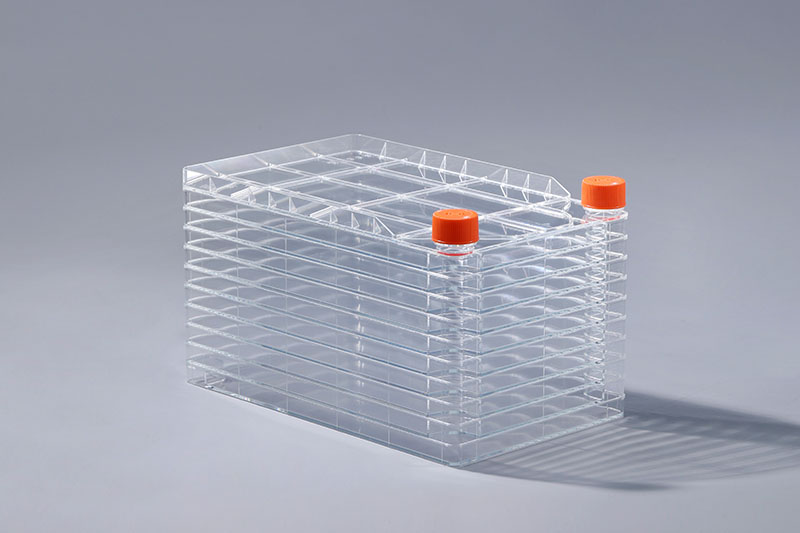je viacvrstvový spotrebný materiál pre bunkové kultúry, ktorý sa väčšinou používa v priemyselnej hromadnej výrobe, laboratórnych operáciách a vo veľkom meradle bunkových kultúr a je ideálnou voľbou pre adherentné bunky. Pri výbere tohto druhu spotrebného materiálu budeme venovať pozornosť kľúčovému faktoru, ktorým je povrchová TC úprava, prečo musí prejsť touto špeciálnou úpravou?Cells možno rozdeliť na dva typy: adherentné bunky a suspenzné bunky podľa rôznych rastových metód. Suspenzné bunky nemusia byť pripojené k podpore, aby rástli a môžu rásť v suspenzii v kultivačnom médiu. Adherentné bunky musia mať rastový povrch, ku ktorému sa môžu pripojiť, aby mohli rásť, a iba hydrofilné pevné rozhranie umožňuje bunkám pripojiť sa. transparentné polystyrénové (PS) suroviny. Ako polymérny materiál má PS dobrú pevnosť a plasticitu a nemá žiadnu toxicitu a stal sa preferovaným materiálom pre jednorazové spotrebné materiály pre bunkové kultúry. Povrch PS je však hydrofóbny, čo samo osebe neprispieva k rastu adherentných buniek. Aby sa zlepšila adhézna schopnosť buniek, je potrebné podstúpiť úpravu povrchovou úpravou a zaviesť hydrofilné skupiny, aby bunky mohli lepšie rásť. rast adherentných buniek. Spotrebný materiál používaný na suspenznú bunkovú kultúru nevyhnutne nevyžaduje takéto špeciálne upravené nádoby, ale spotrebný materiál po ošetrení povrchom TC je vo všeobecnosti vhodný aj na kultiváciu suspenzných buniek.cell factory
Cells can be divided into two types: adherent cells and suspension cells according to different growth methods. Suspension cells do not need to be attached to a support to grow, and can grow in suspension in a culture medium. Adherent cells must have a growth surface to which they can attach to grow, and only a hydrophilic solid interface can allow cells to attach.
The cell factory is mainly used for the culture of adherent cells, which is processed by injection molding of transparent polystyrene (PS) raw materials. As a polymer material, PS has good strength and plasticity, and has no toxicity, and has become the preferred material for disposable cell culture consumables. However, the surface of PS is hydrophobic, which itself is not conducive to the growth of adherent cells. In order to enhance the adherence performance of cells, it is necessary to undergo surface modification treatment and introduce hydrophilic groups to allow cells to grow better.
In summary, the purpose of TC treatment on the cell factory surface is to adapt to the growth of adherent cells. The consumables used for suspension cell culture do not necessarily require such specially treated vessels, but the consumables after surface TC treatment are generally also suitable for the culture of suspension cells.
The FAI climbed 5.9 percent year-on-year in the first 11 months of 2018, quickening from the 5.7-percent growth in Jan-Oct, the National Bureau of Statistics (NBS) said Friday in an online statement.
The key indicator of investment, dubbed a major growth driver, hit the bottom in August and has since started to rebound steadily.
In the face of emerging economic challenges home and abroad, China has stepped up efforts to stabilize investment, in particular rolling out measures to motivate private investors and channel funds into infrastructure.
Friday's data showed private investment, accounting for more than 60 percent of the total FAI, expanded by a brisk 8.7 percent.
NBS spokesperson Mao Shengyong said funds into weak economic links registered rapid increases as investment in environmental protection and agriculture jumped 42 percent and 12.5 percent respectively, much faster than the average.
In breakdown, investment in high-tech and equipment manufacturing remained vigorous with 16.1-percent and 11.6-percent increases respectively in the first 11 months. Infrastructure investment gained 3.7 percent, staying flat. Investment in property development rose 9.7 percent, also unchanged.
 English
English



















































